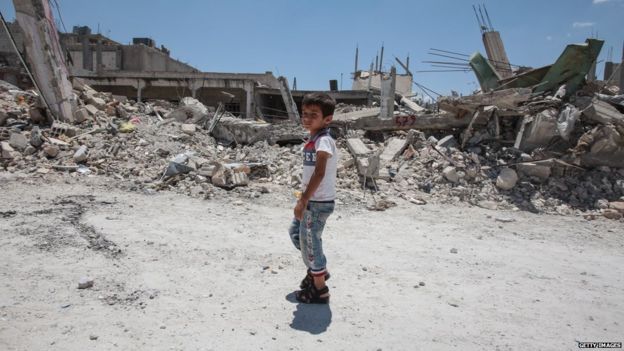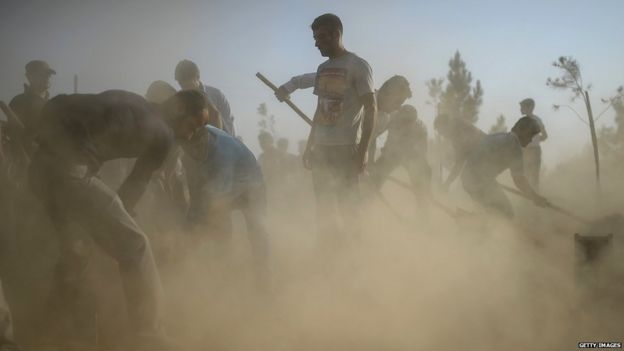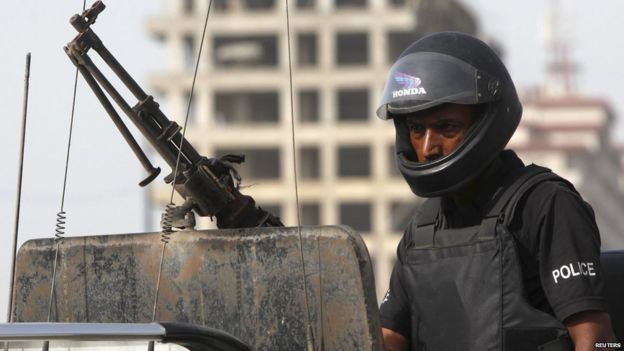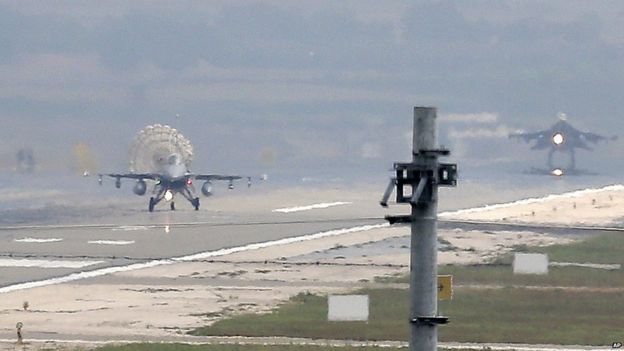Turkey emerges from shadows in fight against Islamic State
- 1 August 2015
- Asia

Turkish President Recep Tayyip Erdogan arrives in Pakistan on Saturday for a meeting with Prime Minister Nawaz Sharif, as Ankara repositions itself as a key player in the region, writes author and journalist Ahmed Rashid.
Less than two years ago Turkey was a major player in Central and South Asia.
Turkish diplomats were mediating peace talks between the Taliban and the Afghan government and between India and Pakistan.
Turkey was creating a new regional co-operation over Afghanistan through its Istanbul process, while shoring up the resolve of the five Central Asian republics and making sure they did not all fall into the hands of Russia.
It was even mediating internal political disputes in Pakistan between the government and the opposition. Everyone it seemed trusted Turkey.
Then suddenly it all stopped.
Turkey disappeared from the world stage and became enmeshed in multiple political problems of its own.
Free for all
Most importantly for the region, Ankara did nothing to stop foreign fighters crossing its border and joining the Islamic State (IS) group, which was wrecking havoc in Iraq and Syria and rapidly spreading its tentacles to Afghanistan, Pakistan and Central Asia.

Turkey's disappearance and then its apparent connivance in allowing IS fighters through its borders caused enormous consternation in the Central Asia region, because these countries were seeing hundreds of their youth joining up with IS every month.
Afghanistan became a virtual free for all, with Iran forcing Shia Hazara youth to fight for President Bashar al-Assad, while other mullahs recruited Pashtuns and Tajiks to fight for IS.
Meanwhile, China began to play a major role in the region - pursuing the same goals as Turkey - but more methodically, such as brokering peace between the Taliban and Kabul and between India and Pakistan and finally giving full membership of the Shanghai Cooperation Organization to India and Pakistan.

Now at long last Turkey may be back as a key regional player.
In the last few days it has re-established its military presence in the Middle East by doing a much awaited U-turn against the IS.
It has promised to stop infiltration of foreign fighters through Turkey, crack down on IS cells and pledge to play a leadership role against IS in the entire region.
Only Turkey has the half a million strong army, NATO-level fire power and equipment and the will to take on IS and put boots on the ground to do it.
IS now represents, ''a national security threat to Turkey'' a senior official in Ankara told the New York Times recently.
All this is music to the ears of governments in South and Central Asia who are looking for a natural leader like Turkey to help forge a common strategy against IS.
The US is seen in the region as a retreating power, as it pulls out from Afghanistan and ceases to play any major role in mediating an end to conflicts either in Afghanistan or between India and Pakistan.
Moreover, there is little competition between Turkey, China and the US, as all want to achieve the same goals.

All these governments are deeply worried at the infiltration of IS into their countries. Afghanistan is already seeing an intense power play with young Taliban deserting their leaders and joining IS.
In Pakistan there is a race amongst some groups to declare themselves the leaders of the IS movement, even though, in reality IS leader Abu Bakr al-Baghdadi has not anointed any such leader or group.
In Central Asia IS has penetrated the top echelons of government, with the desertion to IS of Colonel Gulmuod Khalimov, the commander of Tajikistan's Special Forces.
'Undermine and provoke'
Even though these countries are facing similar threats from IS, al-Qaeda and the Taliban, there is no common strategy and only a minimum of military and intelligence co-operation.
This is where Turkey, which is well trusted by these states, could play a major role.
Turkey's Istanbul process, which aims to bring all the countries of the region together, could now enhance its role to bring about a joint military strategy to combat IS.
The next summit meeting of its members is due to take place in Islamabad in December.

IS has always been much clearer about its intentions.
It has always wanted to drag Turkey into the regional conflict zone, so that its Islamist government could be exposed as being pro-Western.
IS has also wanted to undermine Turkish power in the region and attack the seat of the last caliphate - the Ottomans - who ruled Turkey for half a millennium, so that IS can install its own caliphate.
IS has established cells in Turkey, one of which carried out the provocative suicide attack on 20 July that killed 32 and wounded 100 people in the border town of Suruc.
Turks held massive demonstrations demanding the state protect the people - a factor that led to the Turkish U-turn.
Now Turkey will bomb IS positions in Syria and those of Turkish Kurds.
It has allowed US fighter bombers to use its Incirlik air base in southern Turkey to bomb IS targets - hugely shortening the flying time for US aircraft.
Turkey's involvement could tilt the battlefield against IS and certainly contain the foreign recruits trying to join it.
All these reasons are why the leaders of Afghanistan, Pakistan and Central Asia have welcomed Turkey's return to playing a role against IS in the Middle East region.
They are hoping it can help coordinate their multiple wars against IS into one seamless strategy, which will effectively combat this latest menace to stability in the region.
Ahmed Rashid is a Pakistani journalist and author based in Lahore.
- What can Turkey gain from Nato meeting?
- Turkey's dangerous game
- What is 'Islamic State'?
- Footage reveals IS regime in Mosul
- Islamic State: How it is run
- Fears of Shia muscle in Iraq's Sunni heartland
- Iraq: Growth of the Shia militia
- Can Iraq's army dislodge Islamic State?
- Islamic State's stance on Christians
- Islamic State deploys asymmetry of fear
- Islamic State: Where key countries stand
- Who is Mohammed Emwazi?
- Why is Islamic State so violent?
No comments:
Post a Comment
Please leave a comment-- or suggestions, particularly of topics and places you'd like to see covered